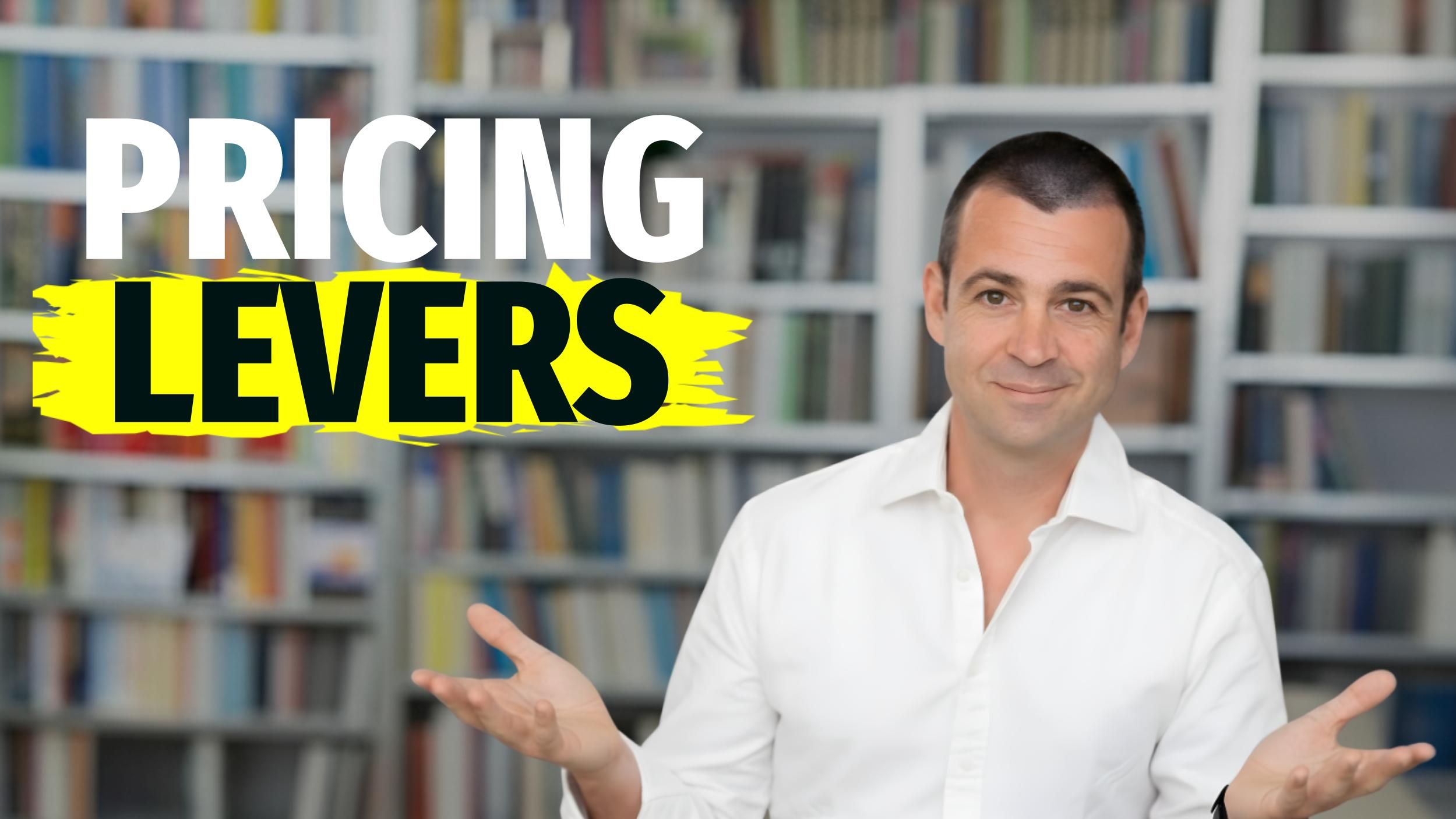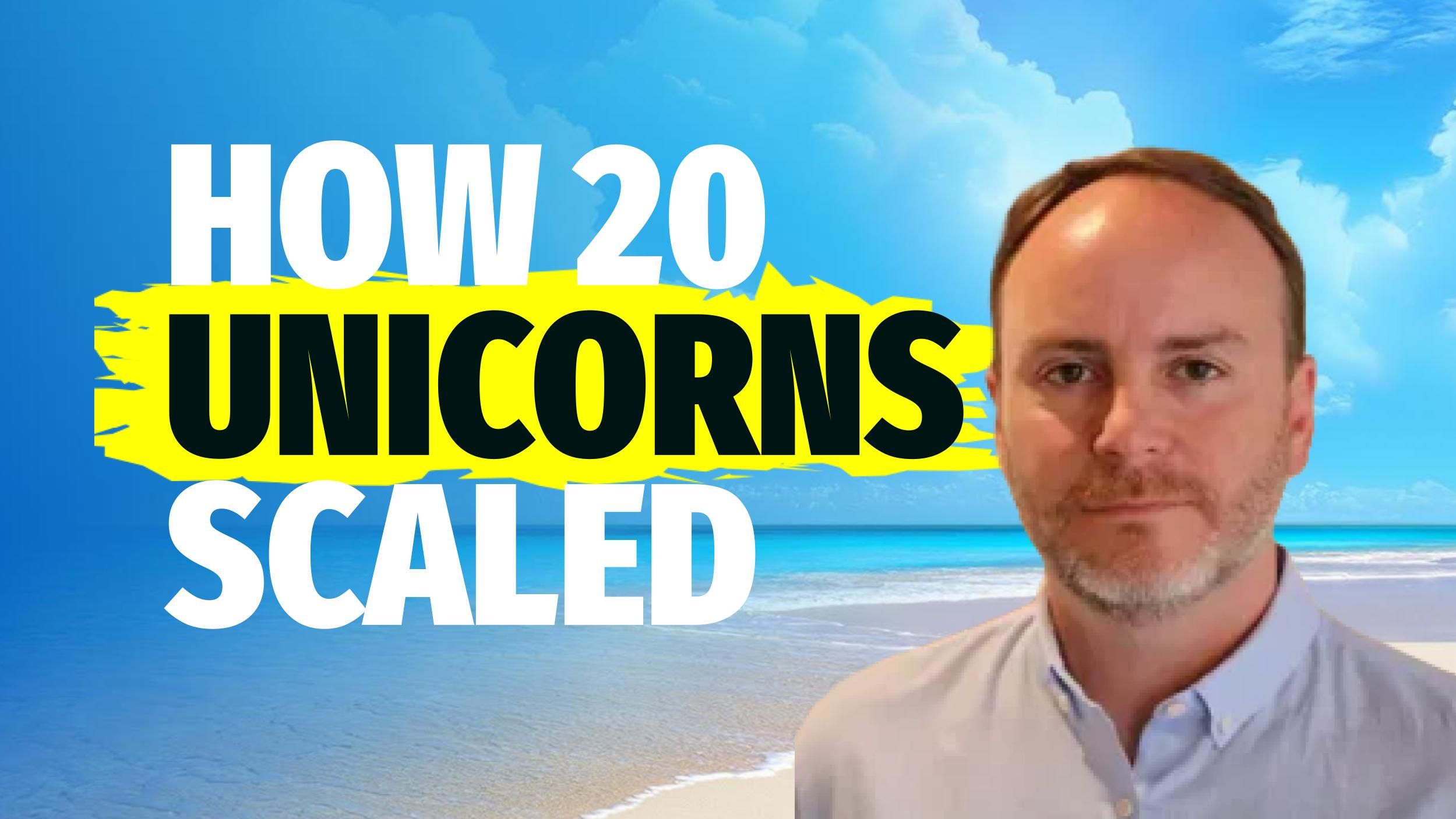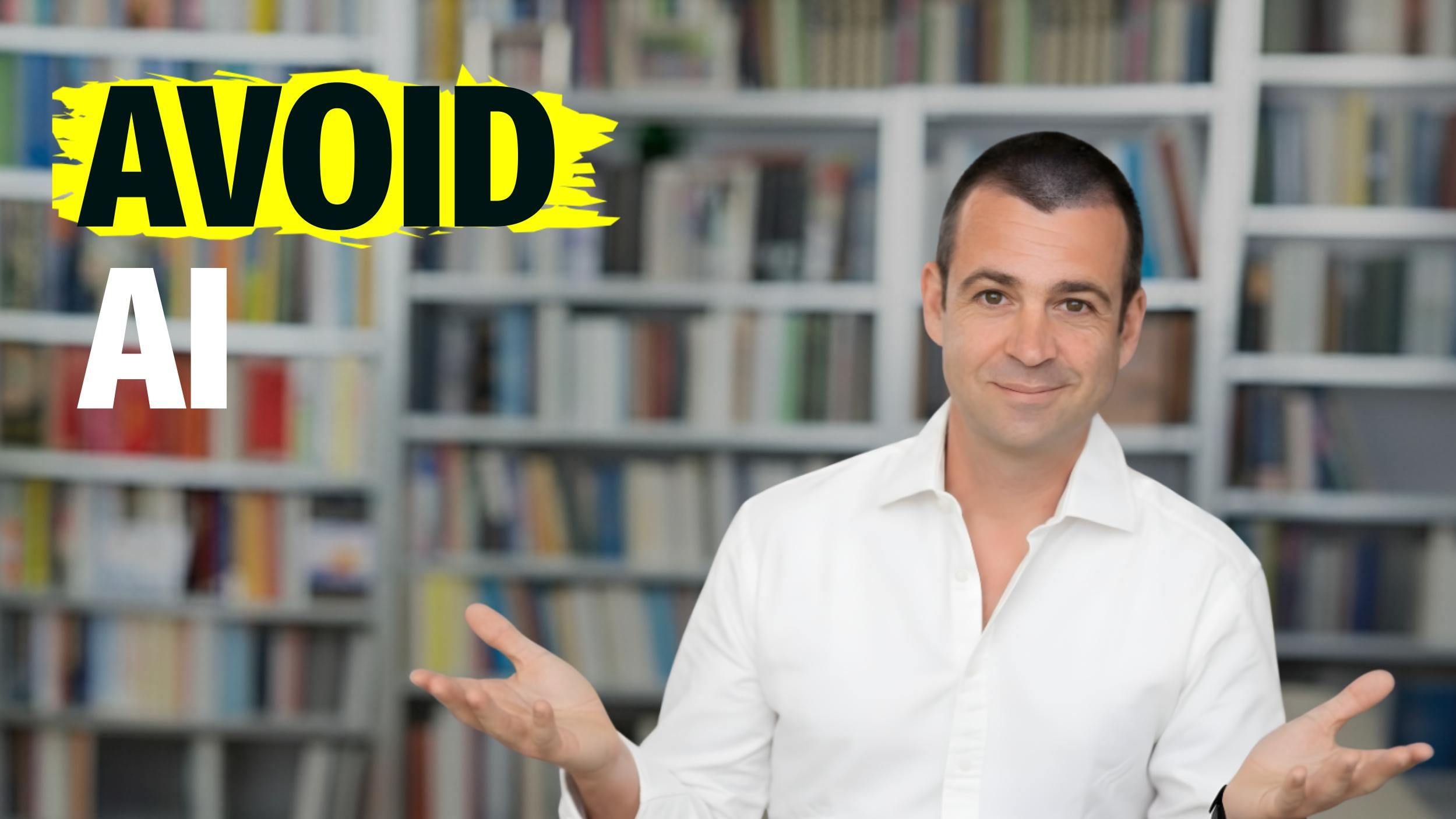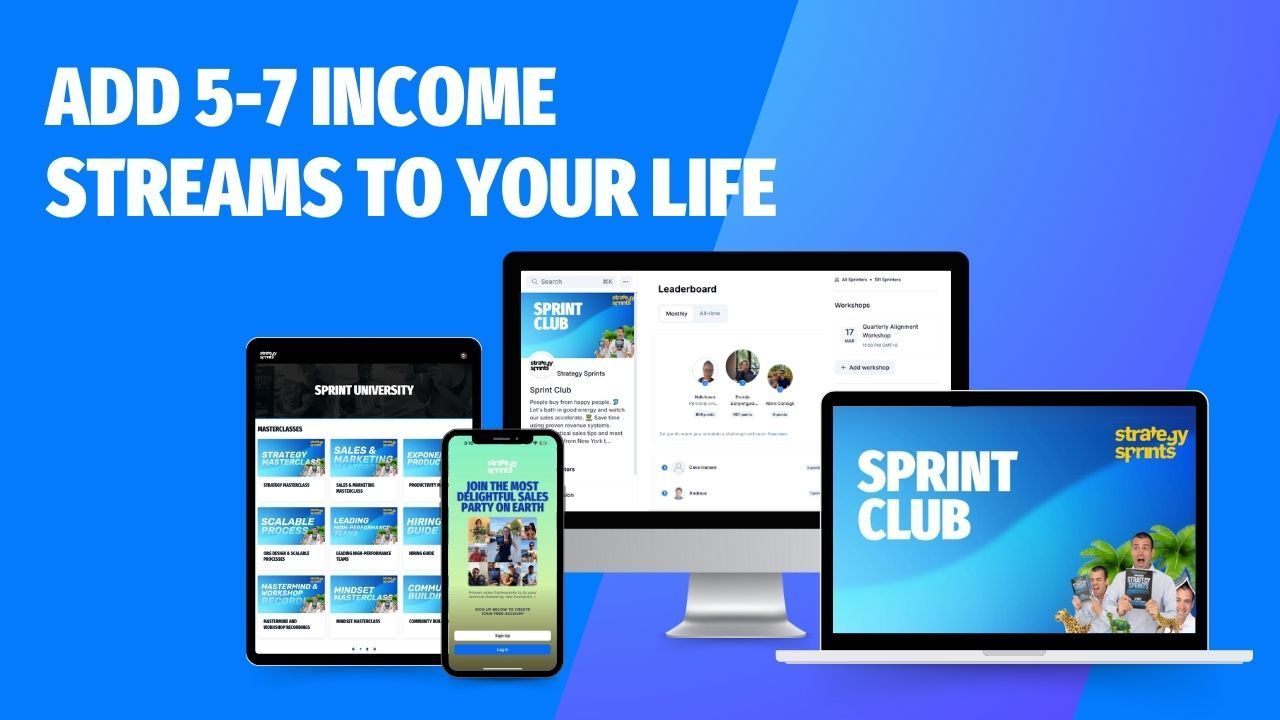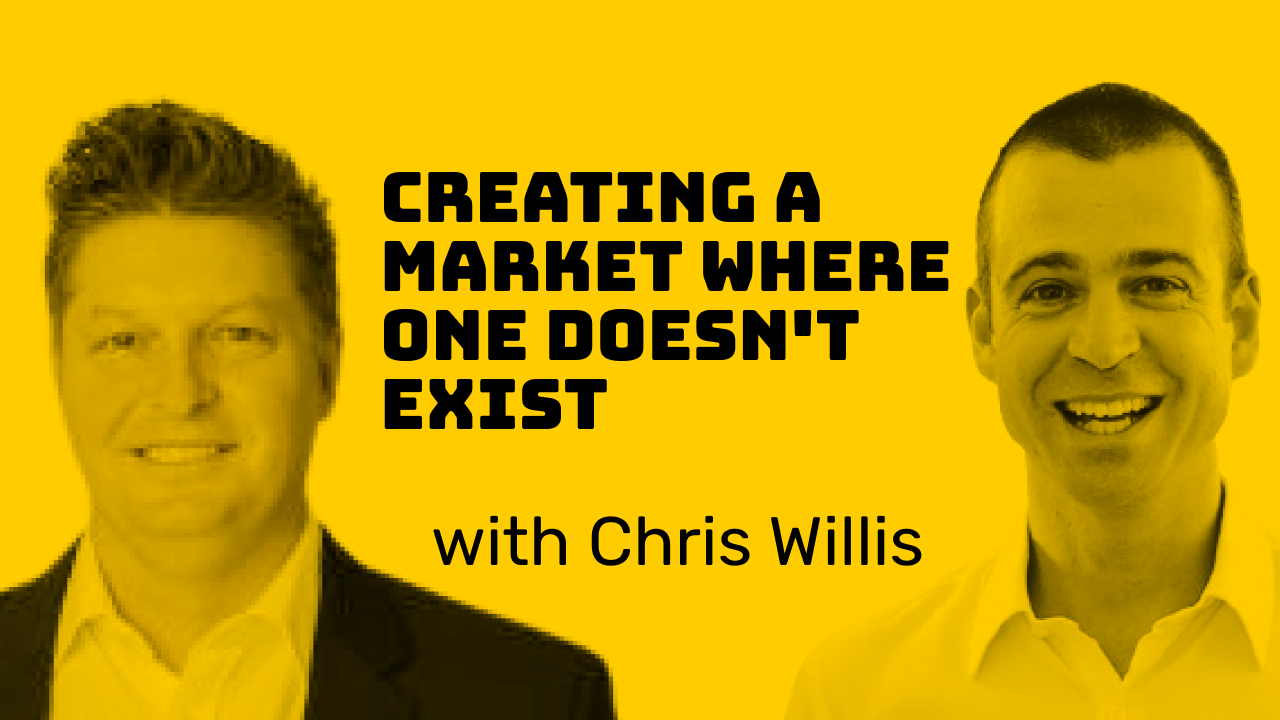
Creating a market, Chris Willis LIVE | STRATEGY SPRINTS 191
In this episode, Simon welcomes Christopher Willis, the managing director, government advisory and programme delivery of LATITUDE. Christopher has been helping people immigrate and settle since 1995. Prior to joining Latitude, he was a Managing Partner of Henley & Partners, responsible for operations in the Americas and Caribbean region including the Citizenship-by-Investment Programmes in St Kitts & Nevis, Antigua & Barbuda, St Lucia and Grenada. Listen to Christopher’s sharing on how to create a market.
3 Valuable Insights:
- Creating a market is making people aware that the option of having something is becoming a necessity for many people
- Geography can be a limit, but it does need to be
- Utilize technology to adapt to a new business environment
(00:00) -Simon: Three, two, one. Roll the footage.
(00:14) -Simon: Welcome back everybody to the strategist Prince podcast. I'm your host Simon Severino. And today my guest has been helping people immigrate and settle since 1995. He's the regional director at investment migration council, and he's also managing director for the Americas and the Caribbean at latitude. Welcome everybody. Chris Willis.
(00:37) -Christopher Willis: Hi Simon Severino. Thanks for having me on the show today.
(00:40) -Simon: So excited because we will deep dive into how to create a market where one doesn't exist and this is particularly relevant in the pandemic year. So before we go there, what are you currently creating?
(00:56) -Christopher Willis: What we're creating is, is really awareness. And this ties into our theme today about creating a market is making people aware that the option of having an alternative residency or citizenship is not as fast becoming a necessity for many people. And so, um, you know, when we look at these, uh, these programs, it's something that people didn't realize maybe existed or that they would be eligible for, or that the level of investment was maybe not as high as they had first considered.
(01:24) -Simon: So tell us what, what are we missing? What, what is out there? And we don't know it. We don't think about it.
(01:31) -Christopher Willis: Yeah. Well, if you look at, I mean, if you look at the United States, for example, you know, they've had a real difficult time with COVID and this has led to many travel bans and your, your average American isn't used to having their freedoms, uh, detracted on, you know, they're, they're used to being able to travel the world, not worry too much about visas, uh, and such like, but because of the pandemic, you know, the wings have really been clipped. You know, they, they can't even get to Canada. You know, the Canada us border, one of the most fluid in the world, you know, has been closed for four months, same getting access to the European union, getting access to Asia. So for many people in the United States, they're saying, well, look, I need to know that I can enhance my mobility and enhance my freedoms by having a second option.
(02:13) -Christopher Willis: And this second option could be a second residency or citizenship. So they start looking at different options. I'll give you an example. So you have the small Caribbean country in, uh, the CA and called St. Kitts and Nevis population of 50,000. One of the smallest countries in the Western hemisphere. You know, with that citizenship, you can travel to 157 odd countries around the world, but in the United States now, as a result of the travel bans, they can only get to about 70. So, you know, this tiny country actually gives you more global mobility than the almighty us passport, you know, which is a, which is, uh, a real interesting reflection of how the, uh, you know, everything has changed as it relates to, uh, to travel around the world. Obviously this isn't permanent, that the us will eventually come out of it and we'll be able to travel again.
(02:58) -Christopher Willis: But it just shows that, you know, if you have this alternative residence or citizenship, you've got more options. You know, when it comes to travel, some people are also looking at it from the perspective of health. They're saying, well, look, you know, if I'm not happy in where I am in the U S or in Europe or wherever it may be, I'm quite happy to go and spend six months, nine months on an Island in the Caribbean. That's very safe. It handled COVID very well. I've got good communications. My kids can study remotely. I can work remotely, but I have the peace of mind knowing that I've got somewhere to go to, um, where I can still enjoy a decent quality of life and still be able to manage my business.
(03:35) -Simon: I am so curious, who do you pick for a strategy, award, but first one word from our sponsors,
(03:42) -Speaker 3: Hey, if you love what you are hearing, you will love our free master classes. Go grab them at strategy, sprints.com.
(03:53) -Simon: So you can only pick one person when everybody's digging this person is zagging? Who is this person?
(03:57) -Christopher Willis: The person I've I'm going to put forward is a known to many people, but in a different capacity. And this is bear Grylls who people know is an adventure, adventure, and, uh, you know, a television host and him and his, uh, co-founder Paul gurney established a firm called becoming X. And what this is, is it focuses on, it helps people understand, you know, what it takes to succeed and to help build confidence. So, you know, whether you're a successful athlete, entertainer business person, you still would have suffered, you know, bouts of, uh, lack of confidence of uncertainty and such, and as how they overcame those to actually go forward and, um, and, and achieve the success that they did. And so it was putting together, uh, digital solutions, um, of, uh, giving personal development programs to schools and colleges and such like, and it's, it's really taking it to another level and bringing in personal experiences, uh, from successful people, but also average people who have really gone through significant adversity and managed to turn their life around and give some real life examples. So it's, it's, it's launching, it's coming out soon. It's a, it's a different direction than he usually goes down or what he's known for. And so I think it's going to be, it'd be very interesting.
(05:09) -Simon: Cool. What are the three books that shaped you most?
(05:13) -Christopher Willis: Well, the, uh, as I said, I'm a big believer in, in people and, um, I, I'm very interested in how people have developed, so it's very much autobiographies that have been important for me. Um, I lived, uh, for many years in Africa and so Nelson Mandela's long walk to freedom is an important one, just because again, it shows all the adversity in his journey and everything where he came out, the other end, which, um, you know, as I know for many people is quite an inspirational book and it's inspirational story. Um, the second is, uh, it's called the game and it's by Ken Dryden, who is an ice hockey goalie for the Montreal Canadians. Um, I'm a big, big hockey fan and, uh, you know, grew up watching the, uh, the dynasty team of the Canadians. And it gives obviously his perspective of some of the key players as this team is tabulated as dynasty.
(05:59) -Christopher Willis: Um, but he's a, he's a real interesting guy because not only was he a professional athlete, one of the most successful goalies, uh, you know, winning seven Stanley cups, he also, you know, took a year out of his playing career to finish articling. So we can qualify as a lawyer, went on to become a lawyer, went onto my, to be the president of a hockey club and then became a federal politician. You know, so again, it just shows the amazing things people can do and not just pigeonhole themselves into one, one aspect of I'm an athlete, I'm an entertainer, I'm this. He was able to go over all these different spheres and he's quite a phenomenal man. And the third, um, technically maybe not a book, but it's a cartoon strip called Calvin and Hobbs, which is, uh, from bill Waterson. Who's, um, you know, it's the story of a six year old boy and his pet tiger and, um, what it does, it just gives some amazing simplicity and honesty of, uh, you know, from the perspective of a young boy, which I think, you know, we have such complicated lives. It's quite nice to have, uh, to be grounded on some of these more, more important things in life.
(06:59) -Simon: Absolutely. I have a five years old and the three years also I will check, check it out with them.
(07:06) -Christopher Willis: Okay. Yeah, definitely. It's worth looking at some phenomenal quotes and just perspectives of, uh, the way it's put out is, is really, really good.
(07:13) -Simon: Beautiful. And tell us more about the people who work with you, who should, who should work with you and what, where can you bring them?
(07:22) -Christopher Willis: Well, the, the people we work with, we work with a variety of different people from, you know, individuals who are looking to have this, this plan B. I mean, we actually look at residents and citizenship almost as a non-traditional insurance policy and, you know, many people also look at divesting their wealth into real estate. In many cases, you can actually purchase real estate in one of these, uh, jurisdictions and use that purchase to qualify for economic citizenship. So you actually get a two for one a bonus, if you like. And especially in the U S you know, there's a big familiarity with the Caribbean. So people are used to either going there to visit or on a boat, for example. And so they could actually purchase a property for lifestyle and then benefit from the second citizenship. Because one of the interesting things that came out with COVID was that even if you owned a property, let's say on one of these islands, unless you had proper status such as being a citizen, they wouldn't let you in.
(08:12) -Christopher Willis: So the borders were closed. So again, it's just giving you that extra protection. If you are looking to go and spend some time on that Island, but you know, whether it's individuals, whether it's, you know, wealth managers, family offices, uh, business, people who were looking to, uh, to device divest their assets, um, anyone with that cyber background, um, who's, who's looking at these programs can certainly contact us, you know, and, and it's important to note it is investment programs. So, you know, many people around the world who we represent, you know, start their lives at an immediate disadvantage, purely based on their country of birth, right? So you look at people, you know, whether you're from Pakistan, Lebanon, South Africa, you know, many parts of the world, they, their doesn't give them much freedom when it comes to traveling without a visa. And so that tends to be, you know, very often an important segment of our, of our market, but as we're talking about the United States and that sort of reality check that they've had because of COVID and having their, uh, travel freedoms taken away, you know, that market has, has shifted, you know, and we're seeing an enormous amount of increase, uh, from the United States and from Western Europe, you know, you look what's happening in the United Kingdom with Brexit, you know, their access to Europe.
(09:23) -Christopher Willis: That's now been hampered so many, you're looking at some of the European options, uh, as British citizens. So it's really just opening the world for those who can, uh, who are able to participate.
(09:34) -Christopher Willis: Geography is a, can be a limit, but it does need to be. Beautiful. And what is, what is one thing that you learned in this pandemic year?
(09:47) -Christopher Willis: Well, without a doubt is changing my perspective as it relates to technology. You know, maybe I'm a bit more old school, you know, in terms of how I would conduct my business, that I, you know, I'm a big believer in personal connections, meeting people and, and establishing those relationships. But, you know, many people were nervous about, uh, you know, can we do business remotely? Can we use all these webinars for marketing? Can we, you know, can we do business, you know, on a zoom call for example. And, um, you know, the fact that we were essentially forced into it, as opposed to just testing it at our, at our own free, will it reinforced the point that technology can work? And so I was, and I know I, I tease our marketing guy. Who's a big believer in all of this. And so he's been able to convince me on that as well. Um, you know, that newer generation who were, uh, very much, uh, you know, tapped in to the, uh, to the digital world. Um, so we've found that spin been, that's been definitely one of the things that's, that's changed, my perspective is, um, you know, how do we, uh, connect, maintain business, maintain relationships, uh, you know, a, with it using the, the benefit of technology, but B as a consequence of the pandemic.
(10:53) -Simon: Who should be my next guest?
(10:56) -Christopher Willis: Well, I mean, as, as I mentioned, I'm a big sports guy, and I think someone who would be phenomenal if he could get them would be sir, Alex Ferguson, who was the, uh, you know, the former manager at, uh, Manchester United, you know, he does a lot of, since he's retired, he's been doing a lot of speaking about talking about motivation and getting the best out of people. And so whether that's from a, you know, performance on sports field or performance in other areas, whether it's business, whether it's personal, um, you know, just the, the impact that he had had on the sport and all the athletes that he coached, I think is phenomenal. So, um, you know, I would definitely put him forward as, as a, as a worthwhile person to speak to.
(11:31) -Simon: Is there anything I forgot to ask you?
(11:34) -Christopher Willis: Well, no, I think the, um, you know, it's, it's been a fun conversation and, um, you know, it's really just, you know, me being able to, to say these opportunities exist, uh, for people who are looking to enhance their freedoms, whether it's from the United States or from, uh, from Europe or any other part of the world, because the, the, the, the, the, the need to have a residence through citizenship is fast becoming a necessity, you know, another tool in the toolbox, if you like. And so, um, you know, more than happy to speak to anybody, who's looking to get more information on that and seeing how they can, uh, they can enhance their freedoms. Where should people go? Is there a specific URL or social media? Yeah. The places are, is our website, which is a latitude world.com. And on there, all my contact details are there.
(12:18) -Christopher Willis: Um, my email is christopher.Willis@latitudeworld.com. Uh, there's a lot of, um, uh, there's a lot of collateral information on the website. And then, you know, we always find a customized solution for people who were interested. So, you know, we would have a consultation figure out exactly what the needs and requirements are of the client, and then we can help them find a, find a solution.
(11:40) -Simon: Beautiful. Thank you so much for being on the show. Come back soon, Chris.
(11:45) -Christopher Willis: Thanks Simon. Thanks. Stay safe, keep well, and, um, we'll see you again.
(11:50) -Simon: See you soon. Bye bye.
(11:51) -Christopher Willis: All right. Take care. Bye for now.
Get our expert sales tips delivered
By submitting you agree to receive our weekly Strategy Sprints Newsletter as well as other promotional emails from Strategy Sprints. You may withdraw your consent at any time via the “Unsubscribe” link in any email or view our privacy policy at ant time.


